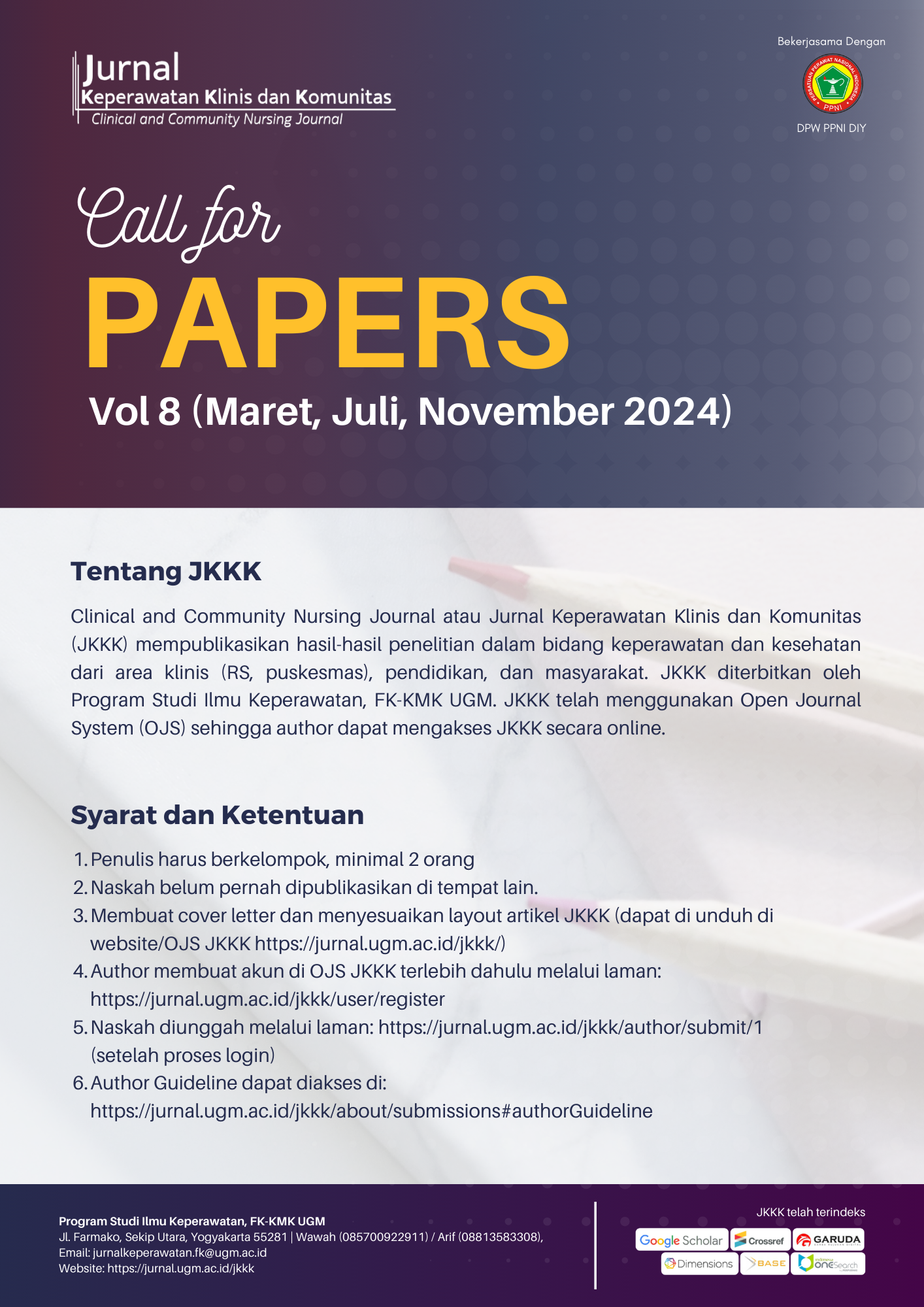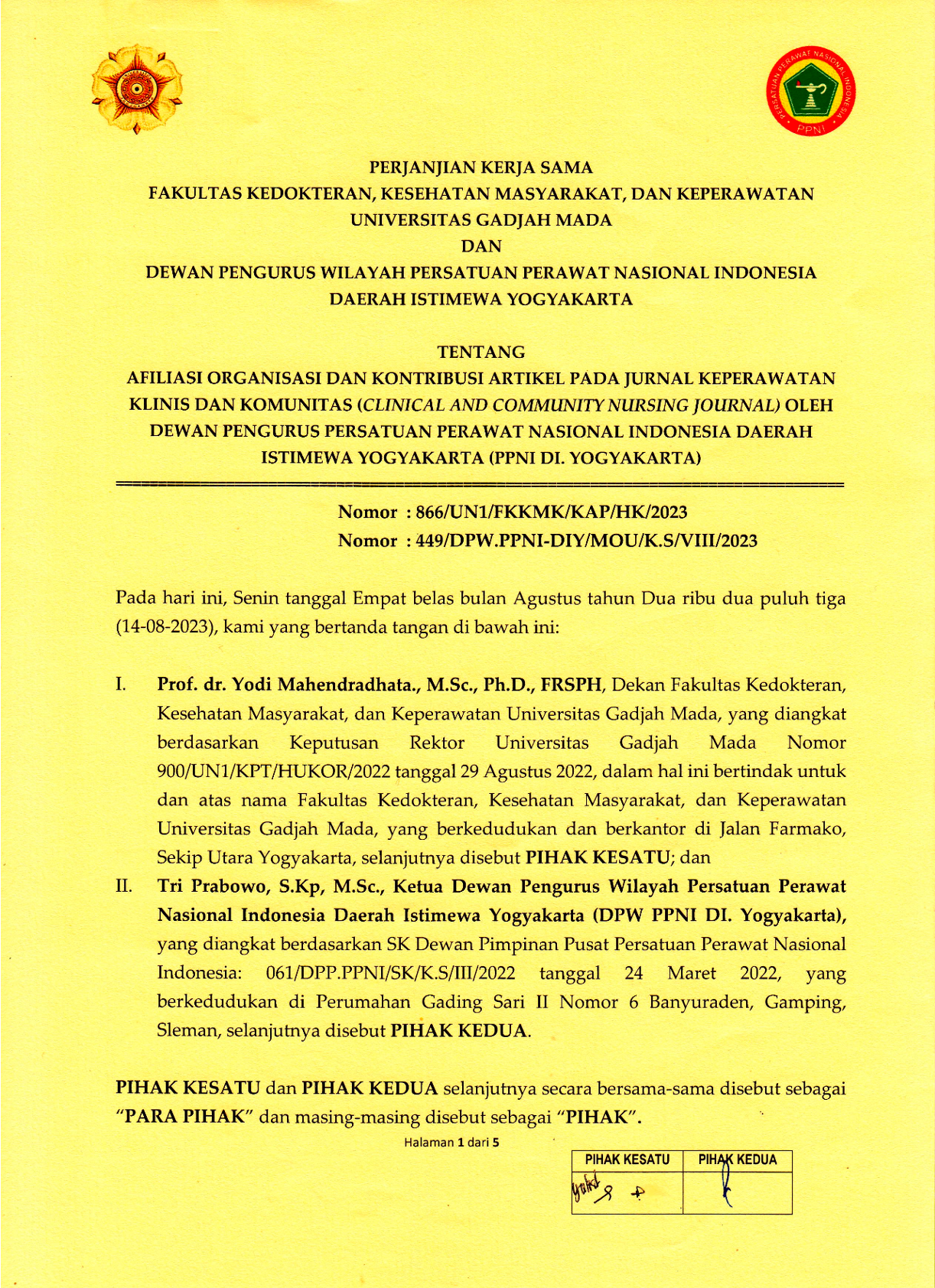Gambaran Pengetahuan Family caregiver dalam Merawat Pasien Demensia
Merry Olvia(1), Heny Suseani Pangastuti(2*), Christantie Effendy(3)
(1) Nursing, Universitas Gadjah Mada
(2) Program Studi Ilmu Keperawatan FK-KMK UGM
(3) Program Studi Ilmu Keperawatan FK-KMK UGM
(*) Corresponding Author
Abstract
Background: Dementia is a chronic disease that will affect the function and the dependency of patient, thus requiring assistance from the caregiver to fulfill their daily needs. Family caregivers providing care to dementia patients are influenced by knowledge. Knowledge is one of the abilities needed in caring for dementia patients.
Objective: The aim of this study is to give the description about caregiver’s knowledge that treating patients with dementia.
Method: This study is a descriptive quantitative study using cross sectional design. Selection of sample was done by using non probability purposive sampling technique. The sample consisted of 53 family caregivers that have been recorded in medical record of Dr. Sardjito Hospital Yogyakarta on May 2018 by using inclusion criteria i.e. 1) took care a patient with dementia, 2) aged more than 18 years old, and 3) willing to become the respondents of this study. Data were obtained by using dementia knowledge assessment scale (DKAS) questionnaire which has been translated to Indonesian language. Data were analyzed using univariate analysis.
Results: Majority respondents were women and aged more than 65 years old and has been taking care the patient more than 6 months. The majority type of dementia of the patients was vascular. Their average knowledge score were 23,25 from the maximum 50 total score. The highest average score was in domain 3, i.e. care consideration (8,17 ± 2,64), and the lowest one is in domain 2, i.e. communication and behavior (4,19 ± 1,82).
Conclusion: Family caregivers’ knowledge about dementia that consist of several domain were still categorized as low.
Keywords: dementia; family caregiver; knowledge
ABSTRAKLatar belakang: Demensia merupakan penyakit kronis yang memengaruhi fungsi kerja dan kemandirian dari pasien, sehingga dibutuhkan peran caregiver dalam perawatan dan pemenuhan kebutuhan sehari-hari. Family caregiver memberikan perawatan kepada pasien demensia dipengaruhi oleh pengetahuan. Pengetahuan merupakan salah satu kemampuan yang diperlukan dalam merawat pasien demensia.
Tujuan: Mengetahui gambaran pengetahuan family caregiver dalam merawat pasien demensia.
Metode: Penelitian ini merupakan penelitian deskriptif kuantitatif dengan menggunakan rancangan cross sectional. Pemilihan sampel dilakukan dengan teknik sampling nonprobability purpossive sampling. Sampel terdiri dari 53 family caregiver pasien demensia yang tercatat klinik memori RSUP Dr. Sardjito pada bulan Mei 2018 dengan kriteria inklusi, yaitu 1) family caregiver pasien demensia, 2) usia lebih dari 18 tahun, dan 3) bersedia menjadi responden penelitian. Data diperoleh dengan menggunakan kuesioner data demografi dan Dementia Knowledge Assesment Scale (DKAS) yang telah diterjemahkan ke dalam bahasa Indonesia. Analisis data menggunakan analisis univariat.
Hasil: Mayoritas family caregiver rata-rata berusia lebih dari 65 tahun, perempuan, dan telah merawat pasien lebih dari 6 bulan. Jenis demensia yang paling banyak diderita pasien adalah demensia vaskular. Pengetahuan family caregiver pasien demensia rata-rata adalah 23,25 dari skor total maksimal 50. Rata-rata skor pengetahuan family caregiver tentang demensia tertinggi adalah pada domain 3 care consideration (rata-rata 8,17 ± 2,64) dan terendah pada domain 2 communication and behaviour (rata-rata 4,19 ± 1,82).
Kesimpulan: Pengetahuan family caregiver tentang demensia masih dalam kategori kurang.
Keywords
Full Text:
PDFReferences
- Prince M, Guerchet M, Prina M. Policy brief for heads of government: The global impact of dementia 2013-2050. London: Alzheimer’s Disease International; 2013.
- Prince M, Wimo A, Guerchet M, Ali G, Wu Y, Prina M. World alzheimer report 2015: The global impact of dementia: An analysis of prevalence, incidence, cost, and trends. London: Alzheimer’s Disease International; 2015.
- Suriastini NW, Turana Y, Witoelar F, Supraptilah B., Wicaksono TY, Dwi E. Angka prevalensi demensia: perlu perhatian kita semua’. SurveyMETER. 2016; 1-4.
- Kementerian kesehatan RI. Gambaran kesehatan lanjut usia di Indonesia. Buletin jendela data dan informasi kesehatan, 1. 2016; 1-18.
- Alzheimer’s Research UK. Dementia in the family: the impact on carers. Cambridge: Alzheimer’s Research UK; 2015 Available from: www.alzheimersresearchuk.org.
- Khoiriyah S. Masalah dan kebutuhan pada pasien demensia di klinik memori RSUP Dr.Sardjito Yogyakarta [Tesis]. Yogyakarta: Universitas Gadjah Mada; 2017.
- Rae-Grant A. Weiner and Levitt’s neurology (8th ed.). Philadelphia: Lippincot williams & wilkins; 2008.
- Savva GM, Brayne C. Epidemiology and impact of dementia. Textbook of alzheimer disease and other dementias. USA: American Psychiatric Publishing; 2009.
- Alzheimer’s Disease International & World Health Organisation. Dementia a public health priority. Geneva: World Health Organization; 2012.
- Prince M, Comas-Herrera A, Knapp M, Guerchet M., Karagiannidou M. World alzheimer report 2016: Improving heathcare for people living with dementia coverage, quality, and costs now and in the future. London: Alzheimer’s Disease International; 2016.
- World Health Organization.Neurological disorders public health challenges. Geneva: WHO; 2006
- Bauer JM, Sousa-Poza A. Impact of informal caregiving on caregiver employment, health, and family. Population Ageing. 2015; 8: 113–145.
- Wang J, Xiao DL, Li X, Bellis AD, Ullah S. Caregiver distress and associated factors in dementia care in the community setting in China. Geriatric Nursing. 2015; 36(): 348-354. doi: 10.1016/j.archger.2016.04.013.
- Grant JA. Increasing Caregivers’ Knowledge to Meet the Needs of Individuals with Dementia [Tesis]. 2014.
- Kementerian Kesehatan RI. Strategi nasional penanggulangan alzheimer dan demensia lainnya: menuju lanjut usia sehat dan produktif. Jakarta: Kementerian Kesehatan RI; 2015.
- Annear MJ, Toye C, Eccleston CE, McInerney FJ, Elliot KEJ, Tranter BK, Hartley T, Robinson AL. Dementia Knowledge Assessment Scale: Development and Preliminary Psychometric Properties. Journal of the American Geriatrics Society. 2015: 63(11): 2375-81. doi: 10.1111/jgs.13707.
- Holmes C, Amin J. Dementia. Medicine. 2016; 48(11). doi: 10.1016/j.mpmed.2016.08.006
- Prince M, Albenese E, Guerchet M, Prina M. World alzheimer report 2014: Dementia and risk reduction an: Analysis of protective and modifiable factors. London: Alzheimer’s Disease International; 2014.
- Harwood RH. Feeding decicions in advanced dementia. J R Call Physicians Edinburg. 2014; 44: 232-7. doi: 4997/JRCPE2014.310.
- Brodaty H, Donkin M. Family caregivers of people with dementia. Dialogues clin neurosci. 2009; 11(2): 217–228. www.ncbi.nlm.nih.gov/pmc/articles/PMC3181916/
- Santos RL, de Sousa, MFB, Ganem AC, Silva TV, Dourado MCN. Cultural aspects in dementia: differences in the awareness of Brazilian caregivers. Trends Psychiatry Psychother 2013; 35(3): 191-7.
- Kristanti MS, Engels Y, Effendy C, Astuti, Utarini A, Vernooij-Dassen M. Comparison of the lived experiences of family caregivers of patients with dementia and of patients with cancer in Indonesia. International Psychogeriatrics. 2017; 30(6): 903-914.
- Annear MJ, Toye C, Elliot KEJ, McInerney F, Eccleston C, Robinson A. Dementia knowledge assessment scale (DKAS): confirmatory factor analysis and comparative subscale scores among an international cohort. BMC Geriatrics. 2017; 17(168). doi: 10.1186/s12877-017-0552-y.
- Alzheimer’s Australia Vic. Perceptions of dementia in ethnic communities. Australia: Alzheimer’s Australia Vic; 2008.
- Hoefer DR. A caregiver’s guide to advanced dementia: Compassionate Evidenced-based Care for the End-stage Demented Patient. Sharp Hospice Care; 2009. Available from: http://avoidablecare.org
- Age UK. Caring for someone with dementia: a practical guide to help you. UK: Age UK; 2016. Available from: www.ageuk.org.uk
- Rockwood K. Treatment expectations in alzheimer’s disease. The alzhaimer review of alzheimer’s disease and other dementias. 2007; 4-8.
- Gerritsen DL, Oyebode J, Dove G. Ethical implications of the perception and portrayal of dementia. Dementia (London). 2016; 17(5): 596-608. doi: 10.1177/1471301216654036.
- Nuffield council on bioethics. Dementia: ethical issues. London: Nuffield council on bioethics; 2009. Available from: http://nuffieldbioethics.org
- The British Psychological Society. Psychological dimensions of dementia: Putting the person at the centre of care. UK: The British Psychological Society; 2016. Available from: https://www.bps.org.uk.
- Alzheimer’s Society. The dementia guide: Living well after diagnosis. London: Alzheimer’s Society; 2017. Available from: www.alzheimers.org.uk.
- Krishnamoorthy A, Anderson D. Managing challenging behaviour in older adults with dementia. Progress in Neurology and Psychiatry. 2011: 20-27.
- Zembrzuski C. Communication Difficulties: Assessment and Interventions in Hospitalized Older Adults with Dementia. Alzheimer’ Association Issue Number D7; 2013.. consultgeri.org.
- Alzheimer’s Association. Behaviors: how to respond when dementia causes unpredictable behaviors. Alzheimer’s & Dementia 11(3); 2017.
- Alzheimer’s Society. The dementia guide: Living well after diagnosis. London: Alzheimer’s Society; 2017. Available from: www.alzheimers.org.uk.
Article Metrics
Refbacks
- There are currently no refbacks.
Copyright (c) 2019 Merry Olvia, Heny Suseani Pangastuti, Christantie Effendy

Jurnal Keperawatan Klinis dan Komunitas (Clinical and Community Nursing Journal)
collaborates with DPW PPNI DIY
![]()
Jurnal Keperawatan Klinis dan Komunitas (Clinical and Community Nursing Journal) is licensed under a Creative Commons Attribution-ShareAlike 4.0 International License.





